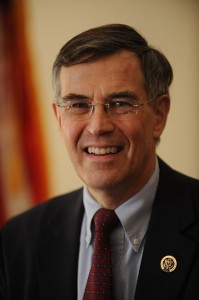On the Hill: Humanists Bid Farewell to Rep. Rush Holt

America goes to the polls today, and Congress is likely on the brink of a power shift as Republicans are predicted to pick up the Senate and several seats in the House. But perhaps the most significant congressional departure won’t derive from election results tonight, but from an announcement made earlier this year.
U.S. Representative Rush Holt (D-NJ) announced in February that he wouldn’t seek re-election to the House of Representatives after failing in his bid to become the new Senator from New Jersey after Sen. Frank Lautenberg died. Holt is something of a rarity in Congress: a scientist (a nuclear physicist no less), Quaker, and political progressive dedicated to supporting fact-based and secular legislation.
His departure from Congress will leave the institution lacking a devoted advocate for the sciences and liberal causes, along with depriving humanists of a dedicated ally. Holt worked with the American Humanist Association in 2013 and 2014 to introduce the Darwin Day resolution, which memorializes the work of Charles Darwin and modern scientists while repudiating intelligent design and affirming the validity of the theory of evolution. The resolution has yet to pass the conservative House of Representatives, but it garners more co-sponsors and attracts greater media attention each year it is introduced. Rep. Holt himself told me how much he cared for the resolution and worked hard with his staff to drum up congressional support for its passage.
Holt also served on a committee focusing on education where he helped draft the College Cost Reduction Act and defended science education from the numerous cuts proposed by the Religious Right. Holt was also known for his leadership of a congressional caucus that focused on promoting scientific research, something that has come received a governmental “cold shoulder” in the past few years as budgets have shrank due to the global recession.
Rep. Holt will be missed for his scientific expertise, his willingness to work with humanist groups, and his dedication to the idea that legislation should be based in reality and seek to serve the interests of all Americans, and not just those that are wealthy or part of the majority religion. Congress has far too few scientists, and losing one more will certainly have a drastic impact on the ability of the institution to serve the interests of the American people.
